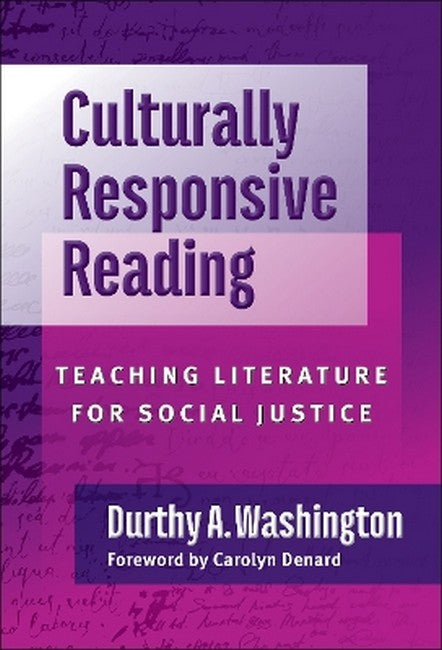Durthy A. Washington is a writer, seminar leader, former English professor, and founder of LitUnlocked (c), which offers workshops and seminars dedicated to the art of mindful culturally responsive reading.
Request Academic Copy
Please copy the ISBN for submitting review copy form
Description
Contents Foreword?ix Acknowledgments?xi Preface: "Why Are We Reading This?"?xiii The Tar Baby Incident?xiii The LIST Paradigm: A Guided Approach to Teaching Literature?xv Creating the LIST Paradigm?xix Introduction: Culturally Responsive Reading: What It Is and Why It Matters?1 "Moving Out Beyond Yourself": Coping With Culture Shock?3 Defining "American" Literature: Reading Western "Classics"?4 Exploring Postcolonial Literature: Telling Our Own Stories?5 Achieving Agency: Rejecting "The White Criterion"?6 Misreading Multicultural Texts?6 Challenging Censorship?10 PART I: The LIST Paradigm: A Guide to Culturally Responsive Reading 1.?Culture in the Classroom: Introducing the LIST Paradigm?15 Teaching at the Academy?16 Exploring Cultural Myths?17 Exploring Definitions of "Culture"?20 Teaching Values?22 Introducing the LIST Paradigm?22 Literary Analysis?23 Literary Criticism?25 LIST Paradigm Exercises?25 Teaching Through the Lens of Culture?27 2.?Telling Our Stories: Exploring the Power of Narrative?35 Defining "Story"?38 Bibliotherapy?39 Mindful Reading?39 Types of Stories?40 3.?Readers, Reading, and the Reading Process?43 Why We Read?44 What We Read?44 How We Read?49 4.?Interrogating the Text: Asking Significant Questions?63 Conflicting Views on Reading Literature?63 Engaging Questions From Other Disciplines?64 Who Is "Qualified" to Speak??67 PART II: Exploring the LIST Paradigm: Four "Keys to Culture" 5.?Language: "How Does the Author Contextualize Linguistic Signs and Symbols?"?75 Language as Resistance?76 Language in Postcolonial Studies?77 Reading Ousmane Sembene's Niiwam?78 Language Creation: Code-Switching and Code-Meshing?79 Language Validation: Standard English and Vernacular?80 Language Use: Unlocking the Power of Language?81 Significant Questions-General?93 Significant Questions-Music?93 6.?Identity: "Who Are These People and What Do They Want?"?97 Identity Politics (Race, Racism, and Colorism)?98 Literary Archetypes?103 Cultural Stereotypes?106 Significant Questions?109 7.?Space: "How Do Characters Negotiate the Text's Physical, Psychological, and Cultural Landscapes?"?111 Physical Space?112 Domestic Space ("Home")?114 Racialized Space?115 Counterspaces (Third Space Theory)?116 Psychological Space?117 The Subaltern?118 Cultural Landscapes: The Slave Ship?119 Narrative Space?119 Significant Questions?120 8.?Time: "How Does the Author Manipulate Time?"?123 Cultural Perceptions of Time?123 Historiography?124 Historicity?124 Exploring Time in Contemporary Fiction?125 Significant Questions?130 PART III: Exploring the LIST Paradigm: Unlocking the Text 9.?Cultural Contexts for The Brief Wondrous Life of Oscar Wao?135 Reading Oscar Wao?136 Language in Oscar Wao?137 History: The Parsley Massacre?138 Major Influences?138 Author Background?139 10.?Exploring the LIST Paradigm: Reading The Brief Wondrous Life of Oscar Wao?142 Introducing the Novel?143 Narrative Structure?144 Language: "How Does the Author Contextualize Linguistic Signs and Symbols?"?144 Identity: "Who Are These People and What Do They Want?"?147 Space: "How Do Characters Negotiate the Text's Physical, Psychological, and Cultural Landscapes?"?150 Time: "How Does the Author Manipulate Time?"?152 Coda?154 Appendix A.1: Exploring the LIST Paradigm: A Reader's Guide?156 Appendix A.2: LIST Paradigm Worksheet?158 Appendix B: Defining Elements of Morrison's Fiction?160 Appendix C: Notes on Narrative Structure?163 Appendix D: Suggestions for Pairing Texts?169 References?173 Index?184 About the Author?194
" Culturally Responsive Reading: Teaching Literature for Social Justice is an essential resource that provides educators with an explicit and accessible approach to analyzing, criticizing, and making meaningful connections across diverse texts that foster conversations between students and teachers related to perspective, culture, race, and systems of power and oppression." -Journal of Adolescent and Adult Literacy

